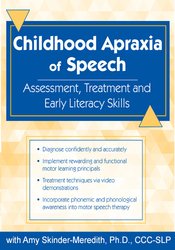
- Stories
- Magazine
- CE Training
- Symposium
- More
Get immediate lifetime access to this content by purchasing the digital seminar/online course instead that you can access using a variety of devices, and one CE certificate is included with purchase! Click the “Digital Seminar” or "Online Course" link below to learn more!
DVD Purchasers please note: In order to view the content, you will be required to have a DVD player or a DVD drive on your computer. Your CE is a separate fee.

Join Amy Skinder-Meredith, Ph.D., CCC-SLP, an expert in motor speech disorders, and learn effective assessment techniques that will allow you to be more confident in your diagnosis. Case examples of both English and Spanish speaking children will be used to guide us in careful observations pertinent to differential diagnosis and determining the relative contribution of various factors to the child’s communication disorder. We will focus on where to begin treatment and how to provide ongoing treatment for these children. Much of the emphasis on treatment will include implementing motor learning principles along with systematic, careful construction of stimuli that is both rewarding and functional for the client. You will learn fun ways to incorporate phonological awareness into speech therapy in a way that promotes a positive self-esteem. Treatment techniques will be demonstrated through video examples and will apply to a variety of ages and levels of severity. You will also learn the latest research regarding literacy issues found in children with CAS.
Save time and money off other submission methods – purchase & take the CE test online for $29.99. Additional processing fees apply for other submission methods (i.e. mail, fax, etc.). Please contact our Customer Service at 1-800-844-8260 for more details. Listed below are the continuing education credit(s) currently available for this non-interactive self-study package. Please note, your state licensing board dictates whether self-study is an acceptable form of continuing education. Please refer to your state rules and regulations. If your profession is not listed, please contact your licensing board to determine your continuing education requirements and check for reciprocal approval. For other credit inquiries not specified below, please contact cepesi@pesi.com or 800-844-8260 before completion.
Certificates of Successful Completion are available for email, download and/or printing from your online account immediately following the successful completion of the post-test/evaluation.
**Materials that are included in this course may include interventions and modalities that are beyond the authorized practice of your profession. As a licensed professional, you are responsible for reviewing the scope of practice, including activities that are defined in law as beyond the boundaries of practice in accordance with and in compliance with your profession's standards. For Planning Committee disclosures, please statement above. For speaker disclosures, please see the faculty biography. For speaker disclosures, please see the faculty biography.
This course contains 6.0 hours of self-study continuing education. It was not offered for ASHA CEUs. Please retain your certificate of completion. If audited for ASHA Certification Maintenance, you can submit this certificate of completion at that time. For state licensure, teacher certification renewal, or other credential renewal, contact those agencies for information about your reporting responsibilities and requirements.
PESI, Inc. is an approved provider with the California Speech-Language Pathology and Audiology Board, #PDP 319. This course meets the qualifications for 6.0 hours of self-study continuing professional development credit for Speech-Language Pathologists or Audiologists, as required by the California Speech-Language Pathology and Audiology Board.
PESI, Inc. is an approved provider with the Florida Board of Speech-Language Pathology and Audiology. Provider Number: 50-399. This self-study course qualifies for 6.0 continuing education credits.
Approved for 7.5 self-study continuing education clock hours for Kansas licensed Speech-Language Pathologists by the Kansas Department for Aging and Disability Services.
This self-study activity qualifies for 6.25 continuing education clock hours as required by many national, state and local licensing boards and professional organizations. Save your activity advertisement and certificate of completion, and contact your own board or organization for specific requirements.
| File type | File name | Number of pages | |
|---|---|---|---|
| Manual (4.40 MB) | 85 Pages | Available after Purchase | |
| CE Test – 060190 – Paper Option (254.7 KB) | Available after Purchase |

Amy Skinder-Meredith, Ph.D., CCC-SLP, received her doctorate from the University of Washington and her M.S. from the University of Arizona. She is an associate clinical professor at Washington State University in Spokane. She is an experienced clinician who has worked in the public school, hospital, and private practice settings. Her primary clinical and research interest is in children with motor speech disorders, and she has published and presented her research on childhood apraxia of speech (CAS) at national conferences. She is investigating the phonological awareness and early reading skills of children with CAS and developing treatment efficacy studies for various CAS treatment techniques Dr. Skinder-Meredith has given numerous workshops for practicing speech-language pathologists across the country on assessment and treatment of CAS.
Speaker Disclosures:
Financial: Amy Skinder-Meredith is employed by Washington State University. She receives a speaking honorarium and royalties from the Childhood Apraxia Association of North America. She receives a speaking honorarium from SpeechPathology.com. She receives a speaking honorarium from PESI, Inc. She has no relevant financial relationships with ineligible organizations.
Non-financial: Amy Skinder-Meredith is on the professional advisory board for the Childhood Apraxia Association of North America and Speechpathology.com.
Access never expires for this product.
Childhood Apraxia of Speech (CAS): An Overview
Evaluating CAS
Principles of Motor Learning and How it Applies to Treatment of CAS
Treatment of CAS
Incorporate Phonological Awareness and Early Literacy Skills
| 5 |
|
| 4 |
|
| 3 |
|
| 2 |
|
| 1 |
|
Satisfaction Guarantee
Your satisfaction is our goal and our guarantee. Concerns should be addressed to: PO Box 1000, Eau Claire, WI 54702-1000 or call 1-800-844-8260.
ADA Needs
We would be happy to accommodate your ADA needs; please call our Customer Service Department for more information at 1-800-844-8260.
Please wait ...